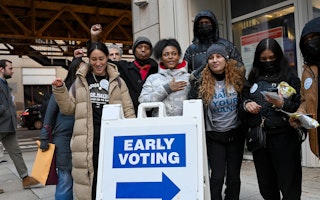Six Questions the Candidates Must Answer at the Presidential Debate and Beyond
By Jeremy Ravinsky
Election season is in full swing and the media is focused on the political horse race. But when the dust settles, all we’ll be left with are the policies that impact real people. As we head into tonight’s Democratic debate—and look toward future Republican debates—here are six issues the candidates must address so that U.S. citizens understand what their new president will do after he or she is elected.
Voting Rights
In 2013, the U.S. Supreme Court struck down the key enforcement provision of the Voting Rights Act of 1965, which required certain states and counties with the worst records of voting discrimination to get federal pre-approval before they implement any changes to their voting laws.
With the Voting Rights Act defanged, what will the next president do to ensure that there are strong federal protections against racial discrimination in voting?
Mass Incarceration
Since 1980, the U.S. prison population has grown by almost 800 percent. The United States has more people behind bars than any other country in the world. Although the incarceration rate has dropped in the past year, much work remains to eliminate the harsh criminal penalties that have destroyed countless families and communities.
What will the next president do to reduce the U.S. prison population and end mass incarceration?
Drones
In 2013, President Obama called for greater transparency in the use of drone strikes to achieve U.S. national security objectives. But two years later, not much more is known about the program.
What will the next president do to improve transparency and accountability? Will he or she support a consistent policy to offer acknowledgement and compensation to civilians killed by drone strikes?
Refugees
The world is in the grips of the worst refugee crisis since the end of World War II. From minorities escaping persecution in Bangladesh and Burma to Syrians fleeing the civil war, millions of people around the world are seeking protection from violence and instability. Yet world leaders have failed to find a resolution.
How will the next president lead the world to a solution that ensures refugees receive the protection they are entitled to?
National Security
The United States continues to confront security challenges around the world. While U.S. public support for direct military intervention has wavered, efforts to train and arm foreign soldiers in places like Iraq, Syria, and Yemen have not worked and have arguably made the situation worse.
How will the next president respond to foreign policy and security challenges without doing more harm than good?
Drug Policy
In the United States, a punitive drug policy has been unsuccessful and caused significant harm, particularly in the African American community. Meanwhile, around the world, countries are calling for a new drug policy regime based on public health instead of prohibition.
These voices are present in the United States, as well: four states and the District of Columbia have voted to allow adult consumption of marijuana. The U.S. Congress is debating sentencing reform measures. And partnerships to address heroin addiction and HIV and hepatitis C epidemics are developing at the federal, state, and local levels.
How will the next president work to shift U.S. drug policy toward a health-based approach?
Until May 2017, Jeremy Ravinsky was a program assistant for the Washington, D.C., office of the Open Society Foundations.


